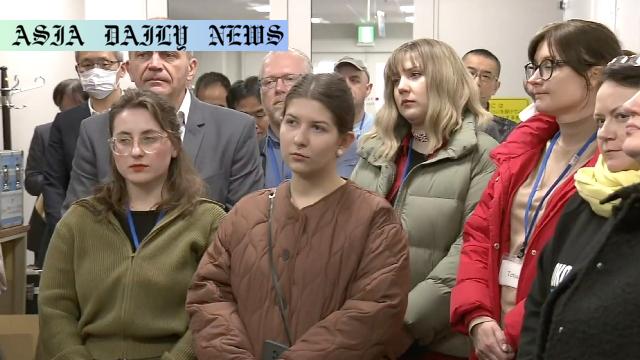Archive: Ukrainian broadcasters visit NHK Archives to gain invaluable techniques for film preservation amidst ongoing conflict.
Ukrainian public broadcaster learns film archiving skills from NHK.
Over 30,000 films of Ukraine’s culture and history at risk.
Training focuses on categorizing and preserving films effectively.
Archived materials are vital proof amidst threats from Russian conflict.

Introduction to the Initiative
Archiving is a monumental responsibility for broadcasters worldwide, especially for nations preserving their historical and cultural identity under constant threat. This importance is magnified for Ukraine’s public broadcaster, which faces the dual challenges of protecting over 30,000 valuable films and ensuring their longevity during a precarious time. A special delegation from Ukraine visited Japan recently to learn advanced film preservation techniques at NHK’s prestigious archive center, a step that holds immense significance for safeguarding Ukraine’s rich cultural heritage.
The Ukrainian Public Broadcaster
Established in 2017 through the unification of various state-run and regional broadcasters, Ukraine’s public broadcaster has been entrusted with preserving the nation’s audiovisual legacy. These archives serve as an invaluable repository of Ukrainian history, capturing the evolution of its culture, politics, and identity over decades. With more than 30,000 films chronicling its past, the broadcaster faces the pressing challenge of safeguarding this heritage amidst an ongoing military conflict with Russia.
The risk is alarmingly evident. The destruction of a TV tower in Kyiv due to an attack heightened the urgency to properly safeguard cultural artifacts as proof of the nation’s existence and struggles. Recognizing this dire situation, Ukrainian broadcasters sought global partnerships and expertise to undertake this enormous responsibility effectively.
Why Japan?
Among the world leaders in film and content archival, Japan’s NHK Archive stands out as a beacon of innovation in video conservation. Located in Kawaguchi City, Saitama Prefecture, near Tokyo, the NHK facility is renowned for its meticulous preservation methodologies. This facility ensures films are preserved for decades while maintaining pristine quality, earning global accolades in the broadcast industry.
The collaborative training initiative was facilitated by the Japan International Cooperation Agency (JICA) and other mediators. It underscores the commitment of global communities to assist nations like Ukraine, which face unprecedented challenges in cultural preservation. For Ukraine, learning from NHK offered invaluable insights into efficient, long-term film preservation methods.
Key Aspects of Archival Training
The 15-member Ukrainian delegation, including the head of archives at the broadcaster, delved into a comprehensive training program. At its core, the training emphasized preserving films in ways that withstand inevitable damage caused by time or unforeseen calamities.
Among the crucial lessons learned were proper categorization techniques based on film content. This organizational aspect ensures quick retrieval and effective resource management. Additionally, the delegation was exposed to the critical role of environmental controls in storage areas. The NHK Archive maintains a constant ambient temperature, proper ventilation, and optimal humidity to ensure that delicate film reels suffer minimal deterioration over time.
Importance of the Training
For the Ukrainian team, the training extended beyond technical learning. It reinforced the overall importance of film as a powerful medium that preserves history and identity. Taisiia Turchyn, the head of archives at Ukraine’s broadcaster, acknowledged this fact during the session. She noted that the current Russian invasion adds a layer of unpredictability, making it essential to protect these archives now more than ever.
The training would enable Ukraine to implement robust systems that preserve not just films but also open avenues for future generations to reconnect with their cultural and historical roots. It emphasized that archival work is not merely a technical activity but also a moral obligation for a country undergoing tumultuous geopolitical conditions.
Looking Ahead
As the delegation continues its training until February 6, there is a sense of determination to transfer this knowledge back to Ukraine. The goal is to establish advanced conservation techniques that can mitigate risks posed by conflict and time alike. This collaboration highlights the indispensable value of international cooperation in not just technological but also cultural domains.
Additionally, the methodologies learned at NHK can inspire broadcasters worldwide, fostering a collective realization of the importance of archiving as a global endeavor. Ukraine’s story serves as both a cautionary tale and a beacon of hope, stressing the endurance of identity and heritage in uncertain times.
Conclusion
This fruitful collaboration between NHK and Ukraine’s public broadcaster proves that preserving culture transcends borders. Amid a conflict-ridden world, these visual histories act as a testament to human civilization’s resilience. By prioritizing archiving, Ukraine sets an example, not only safeguarding its narrative but also inspiring other nations to cherish their histories and identities.
Commentary
The Importance of Safeguarding Cultural Heritage
Preserving cultural artifacts, particularly films that carry a nation’s identity, is an uphill battle, but it is one worth fighting. Ukraine’s efforts to secure its archives amidst conflict remind us that history is fragile, and its protection should always be a priority.
What stands out in this collaboration with NHK is the acknowledgment of shared responsibility across borders. Japan’s willingness to share its expertise demonstrates the power of international solidarity. This partnership serves as a hopeful beacon in a time of war and uncertainty, urging nations to extend mutual support for causes related to humanity’s collective heritage.
Ukraine’s Archival Challenges
However, the challenges cannot be understated. With over 30,000 films, Ukraine faces logistical bottlenecks in categorization, resource limitations in establishing controlled environments, and the unpredictable threat of military destruction. Yet, the determination of the Ukrainian delegation to apply what they’ve learned is commendable. It symbolizes resilience in safeguarding identity at all costs.
Global Takeaway
On a global scale, the endeavor underscores a crucial lesson: archives are not just for historians and enthusiasts. They act as tangible proof of existence, culture, and individuality. Countries should legislate and prioritize archival science, recognizing that every film and document stored today shapes tomorrow’s understanding of history.
In conclusion, Ukraine’s initiative and NHK’s guidance reassert the intrinsic value of cultural preservation, standing as a reminder that even amidst chaos, safeguarding a nation’s identity is an act of profound defiance and hope.


